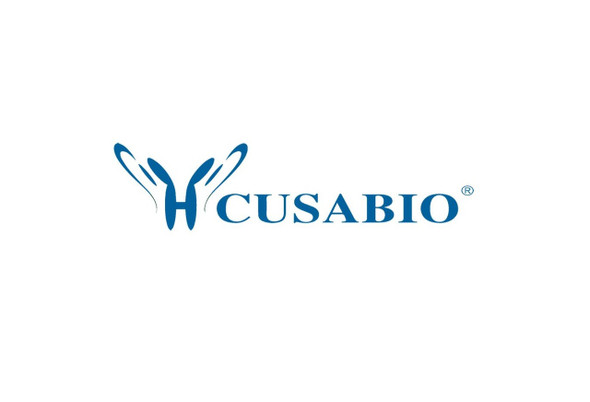Cusabio Human Recombinants
Recombinant Human Cytochrome b-c1 complex subunit 10 protein (UQCR11) | CSB-RP037854h
- SKU:
- CSB-RP037854h
- Availability:
- 13 - 23 Working Days
Description
Recombinant Human Cytochrome b-c1 complex subunit 10 protein (UQCR11) | CSB-RP037854h | Cusabio
Alternative Name(s): Complex III subunit 10Complex III subunit XIUbiquinol-cytochrome c reductase complex 6.4KDA protein
Gene Names: UQCR11
Research Areas: Transport
Organism: Homo sapiens (Human)
AA Sequence: MVTRFLGPRYRELVKNWVPTAYTWGAVGAVGLVWATDWRLILDWVPYINGKFKKDN
Source: E.coli
Tag Info: N-terminal GST-tagged
Expression Region: 1-56aa
Sequence Info: Full Length
MW: 33.6 kDa
Purity: Greater than 90% as determined by SDS-PAGE.
Relevance: This is a component of the ubiquinol-cytochrome c reductase complex (complex III or cytochrome b-c1 complex), which is part of the mitochondrial respiratory chain.This protein may be closely linked to the iron-sulfur protein in the complex and function as an iron-sulfur protein binding factor.
Reference: The DNA sequence and biology of human chromosome 19.Grimwood J., Gordon L.A., Olsen A.S., Terry A., Schmutz J., Lamerdin J.E., Hellsten U., Goodstein D., Couronne O., Tran-Gyamfi M., Aerts A., Altherr M., Ashworth L., Bajorek E., Black S., Branscomb E., Caenepeel S., Carrano A.V. , Caoile C., Chan Y.M., Christensen M., Cleland C.A., Copeland A., Dalin E., Dehal P., Denys M., Detter J.C., Escobar J., Flowers D., Fotopulos D., Garcia C., Georgescu A.M., Glavina T., Gomez M., Gonzales E., Groza M., Hammon N., Hawkins T., Haydu L., Ho I., Huang W., Israni S., Jett J., Kadner K., Kimball H., Kobayashi A., Larionov V., Leem S.-H., Lopez F., Lou Y., Lowry S., Malfatti S., Martinez D., McCready P.M., Medina C., Morgan J., Nelson K., Nolan M., Ovcharenko I., Pitluck S., Pollard M., Popkie A.P., Predki P., Quan G., Ramirez L., Rash S., Retterer J., Rodriguez A., Rogers S., Salamov A., Salazar A., She X., Smith D., Slezak T., Solovyev V., Thayer N., Tice H., Tsai M., Ustaszewska A., Vo N., Wagner M., Wheeler J., Wu K., Xie G., Yang J., Dubchak I., Furey T.S., DeJong P., Dickson M., Gordon D., Eichler E.E., Pennacchio L.A., Richardson P., Stubbs L., Rokhsar D.S., Myers R.M., Rubin E.M., Lucas S.M.Nature 428:529-535(2004)
Storage: The shelf life is related to many factors, storage state, buffer ingredients, storage temperature and the stability of the protein itself. Generally, the shelf life of liquid form is 6 months at -20?/-80?. The shelf life of lyophilized form is 12 months at -20?/-80?.
Notes: Repeated freezing and thawing is not recommended. Store working aliquots at 4? for up to one week.
Function: This is a component of the ubiquinol-cytochrome c reductase complex (complex III or cytochrome b-c1 complex), which is part of the mitochondrial respiratory chain.; FUNCTION
Involvement in disease:
Subcellular Location: Mitochondrion inner membrane
Protein Families: UQCR11/QCR10 family
Tissue Specificity:
Paythway: Cardiacmusclecontraction
Form: Liquid or Lyophilized powder
Buffer: If the delivery form is liquid, the default storage buffer is Tris/PBS-based buffer, 5%-50% glycerol. If the delivery form is lyophilized powder, the buffer before lyophilization is Tris/PBS-based buffer, 6% Trehalose, pH 8.0.
Reconstitution: We recommend that this vial be briefly centrifuged prior to opening to bring the contents to the bottom. Please reconstitute protein in deionized sterile water to a concentration of 0.1-1.0 mg/mL.We recommend to add 5-50% of glycerol (final concentration) and aliquot for long-term storage at -20?/-80?. Our default final concentration of glycerol is 50%. Customers could use it as reference.
Uniprot ID: O14957
HGNC Database Link: HGNC
UniGene Database Link: UniGene
KEGG Database Link: KEGG
STRING Database Link: STRING
OMIM Database Link: OMIM









